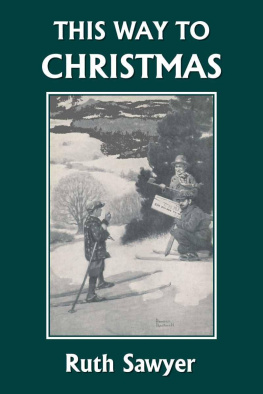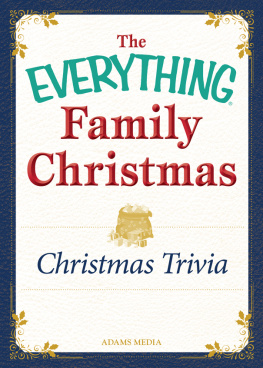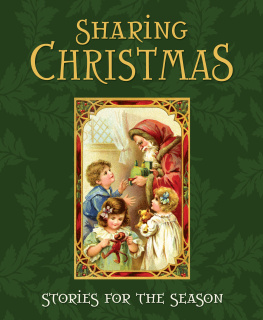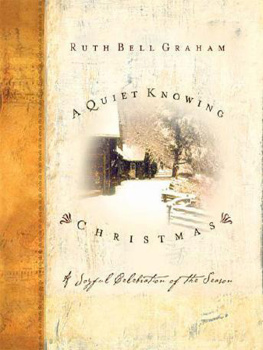This Way to Christmas
by
Ruth Sawyer
Yesterday's Classics
Chapel Hill, North Carolina
Cover and Arrangement 2010 Yesterday's Classics, LLC
All rights reserved. No part of this book may be reproduced or retransmitted in any form or by any means without the written permission of the publisher.
This edition, first published in 2010 by Yesterday's Classics, an imprint of Yesterday's Classics, LLC, is an unabridged republication of the work originally published by Harper and Brothers Publishers in 1916. This title is available in a print edition (ISBN 978-1-59915-221-9).
Yesterday's Classics, LLC
PO Box 3418
Chapel Hill, NC 27515
Yesterday's Classics
Yesterday's Classics republishes classic books for children from the golden age of children's literature, the era from 1880 to 1920. Many of our titles are offered in high-quality paperback editions, with text cast in modern easy-to-read type for today's readers. The illustrations from the original volumes are included except in those few cases where the quality of the original images is too low to make their reproduction feasible. Unless specified otherwise, color illustrations in the original volumes are rendered in black and white in our print editions.
Author's Note
The author wishes to acknowledge the courtesy of Mrs. William Sharpe, who has so kindly given her permission for the adaptation of parts of Fiona Macleod's "Muime Chroisd" for the legend of St. Bridget, told here by Johanna. The author found many fragments of the legend in the north of Ireland; but nowhere was it complete as recorded by Fiona Macleod from the Island of Iona.
Contents
CHAPTER I
The Chapter before the Beginning
I W ONDER if you know that stories have a way of beginning themselves? Sometimes they even do more than this. They tell themselvesbeginning and ending just where they pleasewith no consideration at all for the author or the reader.
Perhaps you have discovered this for yourself; you may have in mind this minute some of the stories that you wished had begun long before they didand others that ended before you thought they had any business doing so. These have a very unpleasant way of leaving your expectations and your interest all agog; and I have not a doubt that you have always blamed the author. This is not fair. In a matter of this kind an author is just as helpless as a reader, and there is no use in trying to coax or scold a story into telling itself her way. As sure as she tries the story gets sulky or hurt, picks up its beginning and ending, and trails away, never to come back; and that story is lost for all time. You may try it yourself if you do not believe me.
Now, if I could have had my way, I should have begun with David in the window nook at dusk-hour, looking out on the Hill Country all white with the gathering snow; and I should have said:
"It was the year after lastand the year before nextand just seven days before Christmas"
I have begun this way a hundred times, and every time the same thing happens. The story behaves disgracefully. It will have none of my way. I have actually heard it screaming: "No! I won't begin there! I won'tI won'tI won't!" After which it always runs for the door. As a result I have become completely cowed and I have given in. I am making believe now (and so must you, for it never does to let a story get in a bad humor) that after all this is the best beginning.
It was late fall when David's world dropped away from him; at least to David that is what seemed to happen. When one loses the very things one always expects to havebig things like mother and father, home and the boys on the blockwhy, there is not so very much of the world left. To David, speeding toward the Hill Country on the big express with Johanna, it seemed as if there was not enough left to fill even one of the many empty days that lay before him.
It had all come about because of father being a scientist. Just what a scientist was David had never felt quite sure, but he knew it meant having a great deal of knowledge and very little timetime for boys. It also meant forgetting things that even David was supposed to remember; things like going to bed, and coming home at dinner-time, and putting on a coat when it was cold, and rubbers when it rained. Mother always laughed at these and said that father was more trouble to look after than David; and she wondered what she would do if the time ever came when she would have to decide between the two of them, and which needed her most.
And then, without any warning, that time had come. Very suddenly father came home one night and announced that there was a fresh development of an almost unknown bacillus among the soldiers in the Eastern war zone; it was the chance of a lifetime for a scientist, and he would go as soon as he could pack and make necessary arrangements. The next moment he had plunged into his pocket for his note-book, and only David had seen how white and still mother had grown. When she spoke at last there was a funny little catch in her voice that sounded as if it had tried to be a laugh, but somehow could not manage it.
"I hoped and prayed that this wouldn't happen quite so soonthis having to decide between my big boy and my little boy."
Father had laughed outright. "Nonsense, there is nothing to decide. Of course you stay with David. The war country is no place for either of you, and I shall manage perfectly by myself."
"The war country is no place for David; but there are plenty of women over there working side by side with their husbands. Oh, my dear, my dear!"
Mother's arms had gathered them both in and mother was holding them close. It was to father, however, that she was speaking. "I believe you are my little boy, after all. Manage! Over there! When you can't take care of yourself in your own civilized country! No, my dear, you need a mother more than David does. Besides, there's Johanna; we'll send for her. She will look after David almost as well as I can; but what would she do with you!" This time the laugh had right of way and rippled all over mother's face.
Father had stopped making notes and was looking at them both with that funny wrinkly smile about his mouth that David loved to see.
"Well, sir, what do you think about it?" he said, looking straight at David.
David had squared his shoulders and straightened his chin; but it took two hard swallows before he could answer. "I think, sir, that mother is right. You see I'm eight, going on nine; and when, aman's that old he ought to be able to look after himself for a while. Don't you think so?"
"He certainly ought to; but it seems that there are some who never are quite able." And father's hand had suddenly reached up to mother's, which was about his shoulder.
That is all there had been to it. The next day Johanna had comegood, Irish Johanna, who had taken care of him as a baby and had stayed until he had outgrown his need of her and she had married Barney. The day after, he had said good-by to the boys on the block; and he had said it as one about to depart upon a rare adventure, taking his leave of less fortunate comrades. He did not intend that they should discover how much of his world had dropped away from him, or how he envied them the continued possession of theirs. Moreover, it increased his courage threefold to make believe that what had happened was not so bad, after all. In this manner he was able to assume an added stature, one fitting his newly acquired manhood, when the time came to swing the door of his home tight shut; and he was able to say a brave good-by to father and mother.












